2019年春外研版高中英语必修四Module 5 A Trip Along the Three Gorges gramma2课件(28张ppt)
文档属性
| 名称 | 2019年春外研版高中英语必修四Module 5 A Trip Along the Three Gorges gramma2课件(28张ppt) | 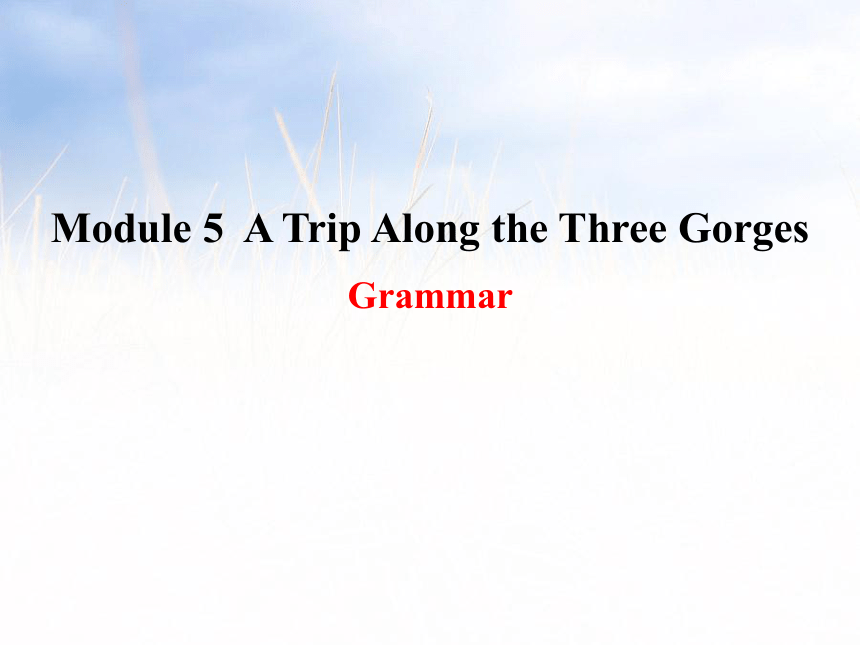 | |
| 格式 | zip | ||
| 文件大小 | 457.7KB | ||
| 资源类型 | 教案 | ||
| 版本资源 | 外研版 | ||
| 科目 | 英语 | ||
| 更新时间 | 2019-04-19 08:12:26 | ||
图片预览

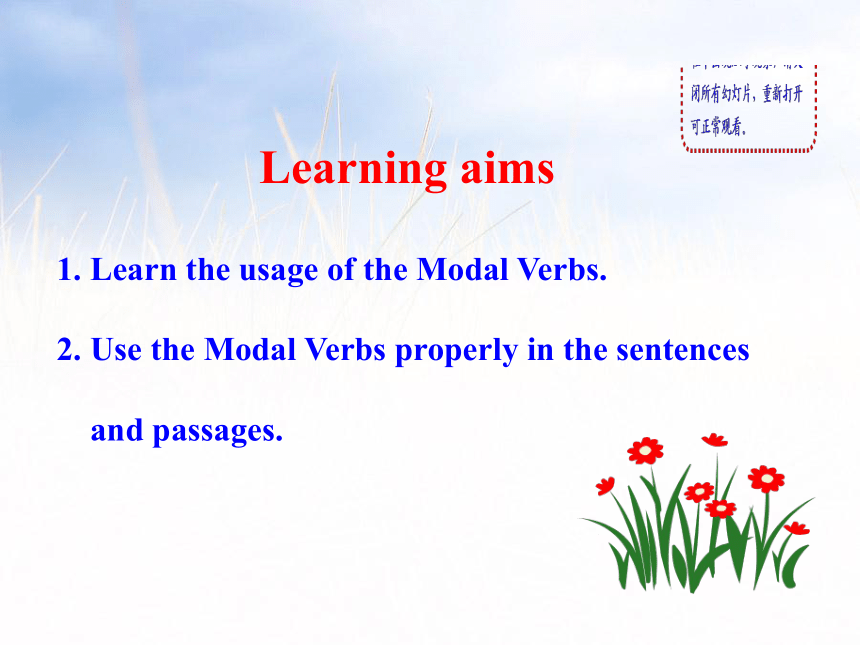
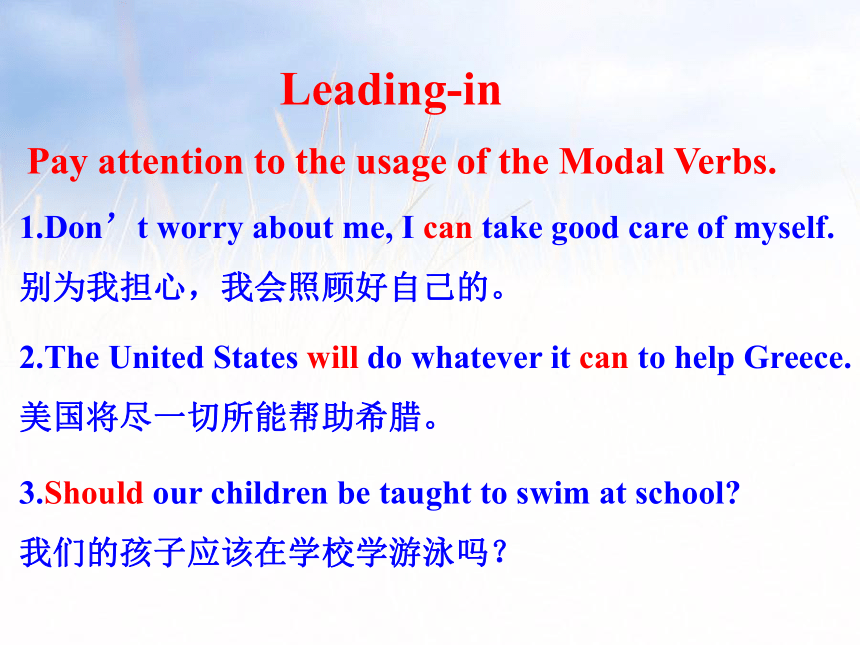
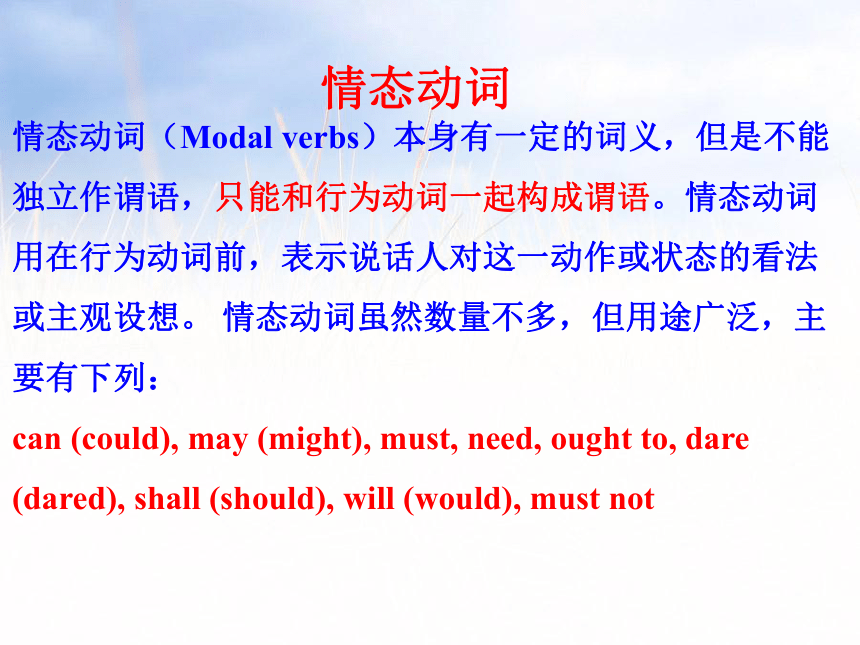

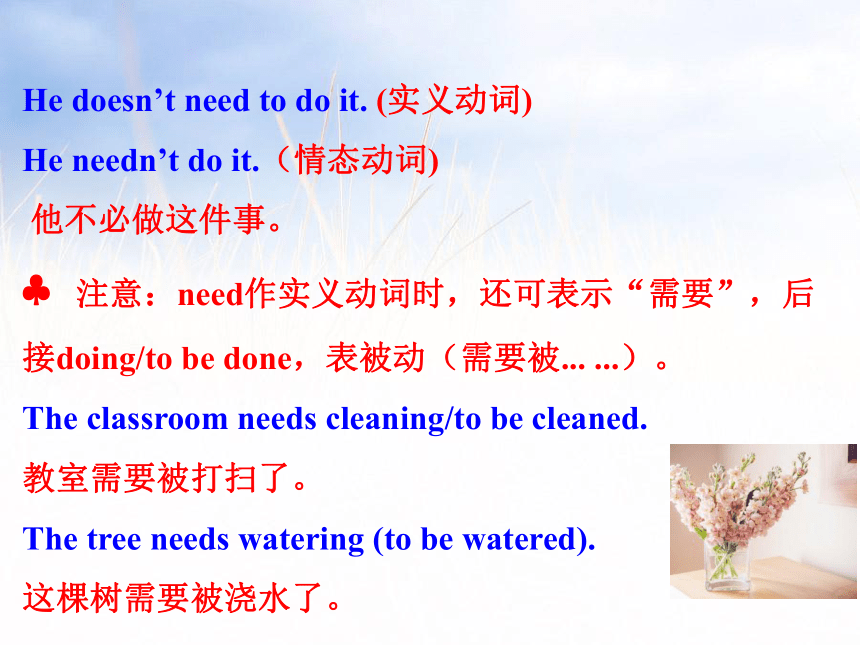



文档简介
课件28张PPT。Module 5 A Trip Along the Three Gorges
Grammar 1. Learn the usage of the Modal Verbs.
2. Use the Modal Verbs properly in the sentences
and passages.Learning aimsLeading-in1.Don’t worry about me, I can take good care of myself.
别为我担心,我会照顾好自己的。2.The United States will do whatever it can to help Greece.
美国将尽一切所能帮助希腊。3.Should our children be taught to swim at school?
我们的孩子应该在学校学游泳吗?Pay attention to the usage of the Modal Verbs.情态动词(Modal verbs)本身有一定的词义,但是不能独立作谓语,只能和行为动词一起构成谓语。情态动词用在行为动词前,表示说话人对这一动作或状态的看法或主观设想。 情态动词虽然数量不多,但用途广泛,主要有下列:
can (could), may (might), must, need, ought to, dare (dared), shall (should), will (would), must not情态动词一、可兼作行为动词的情态动词: dare 、need
dare和need作情态动词时不用于肯定句,没有人称和数的变化(dare的过去式为dared);作实义动词时可用于肯定句、否定句或疑问句,有人称和数的变化。
He didn’t dare to do it. (实义动词)
He dare not do it.(情态动词)
他不敢那么做。He doesn’t need to do it. (实义动词)
He needn’t do it.(情态动词)
他不必做这件事。
? 注意:need作实义动词时,还可表示“需要”,后接doing/to be done,表被动(需要被... ...)。
The classroom needs cleaning/to be cleaned.
教室需要被打扫了。
The tree needs watering (to be watered).
这棵树需要被浇水了。Two eyes can see more than one.
I am so strong that I can lift this stone.
He said that Jack couldn’t finish his work in such a short time.
Could you follow my step?
He is only four, but he is able to read.
She was able to do it without my help.
Will you be able to come to my party tomorrow?表能力can could be able to有时态变化Grammar-1. Observation(3ms)二、 表示能力的情态动词can, could, be able to
的用法:
be able to 能用于各种时态,表示主观意愿,强调要克服困难去做某事。它的过去时用was / were able to,相当于managed to do sth. 或succeeded in doing sth.。它的将来时用will be able to。
can / could 只能表示现在或过去的能力,表示主观能力,不表示意愿。例如:Everyone was able to escape when the earthquake happened.
地震发生时,大家都设法逃了出去。(2017·北京高考)Samuel,the tallest boy in our class, can easily reach the books on the top shelf.
塞缪尔在我们班上个子最高,能轻易地够到书架顶上的书本。can可以表示许可,可代替may
You can go home now. 你现在可以回家了。
can表示惊讶,怀疑,不相信的语气
Can the news be true? 这消息会是真的吗?
can表示征求意见,请求,could语气更加委婉。
Could you tell me how to get to the airport?
您能告诉我怎么去机场吗?
can表示偶尔出现的事实。
He can be a hard man sometimes. 他有时挺难相处的。can的具体用法 【知识拓展】 can 的一些特殊搭配
(1)can’t be too/over…adj./adv. =can’t…adj./adv. enough 再……也不过分
A parent can’t be over/too patient.
We can’t drive carefully enough.
(2) can’t help/choose but do… 不得不做……
She can’t help but drop school. 父母再耐心也不过分。开车时我们再小心也不为过。她不得不辍学了。(3)can’t help (to) do 不能帮忙做
can’t help doing 情不自禁做
(4)can’t/couldn’t agree more 十分赞成
(5)it can’t/couldn’t be better 十分好,非常好 Grammar-2. Observation(3ms) You can go now.
I won’t let you down.
Could I say it in Chinese?
May I know your name?
Would you mind closing the door?
Shall we dance?
Might I have a word with you?语气强 弱表许可,征询意见can, will
could / may / would / shall / might三、表示许可: may / might, can / could
might, could 比较委婉, 一般多用于疑问句。
can, may 表达的语言比较随便。
在以could, might 表示征求对方意见或表示请求时,回答应相应使用can, may。must
may, might, can, could肯定句语气强 弱表可能性(推测)There must be a mistake.
It can be true.
In those days few workers could support their
families.
You may walk ten miles without seeing a house.
He might get there on time.Grammar-3. Observation(2ms)语气强 弱表不可能(推测)can’t, couldn’t
may not, might not否定句She can’t be serious.
We couldn’t have done better.
People may not pick flowers in this garden.
She was afraid they might not like the idea.Grammar-4. Observation(2ms)mustn’t, shouldn’t had better not表禁止We mustn’t waste our time.
They shouldn’t leave so soon.
You’d better not disturb him.Grammar-5. Observation(2ms)should, must have to表义务(应该)有时态变化Grammar-6. Observation(3ms)You should do what your parents tell you.
If you can’t finish the book by then, you must come and renew it.
This is a lovely party, but we have to go because of the baby-sister.
The bridge was not wide enough so that somebody had to give way.1. 表示否定的情态动词的用法:
部分情态动词的否定式是情态动词中的考点之一。 mustn’t 不准, 禁止
needn’t 没必要 ( = don’t have to )
can’t 不能; 不可能
shouldn’t 不应该 ( = ought not to )【点 津】(2017·天津高考)My room is a mess,but I needn’t clean it before I go out tonight.I can do it in the morning.
我的房间很乱,但今晚出去之前我不需要打扫。我可以在早晨打扫。2. shall和will 的多种意义的区别:
shall / will+ 动词原形均可表示将来。 过去式为 should, would。
shall 1)可用于第二、三人称陈述句,表示说话人给对方的命令、 警告、允诺或威胁。当颁布法律规定时,也用shall。2)用于第一、三人称疑问句,表示征求对方的意见。
will 可表示意愿、常出现的动作,在疑问句中表示请求和建议。Shall the driver wait outside?
司机在外面等着可以吗?
It has been announced that candidates shall remain in their seats until all the papers have been collected.
已宣布,在所有试卷收上来之前,应试者必须呆在自己的座位上。3. 情态动词短语的使用:
would like to do… 想要做……
would rather do…than do… 宁可……也不……
would rather + 从句 宁可……
had better do... 最好做……
used to do… 过去常常【知识拓展】
(1)used to+do 过去常常做……
be used to+v.- ing / n. 习惯于……
be used to+do 被用来做…… (2) used to, would
used to过去常做……,但现在不做了,常与like, be等状态动词连用
would (do)表示“过去常作……,但不强调现在如何,并带有赞扬、厌恶等感彩。4.部分情态动词的问与答:
(1) Need I…?
Yes, you must. /No, you needn’t (don’t have to).
(2) Must I…?
Yes, you must. /No, you needn’t (don’t have to).
(3) May I…?
Yes, you may. (=Yes, certainly/of course.)/
No, you may not. (=No, you can’t/mustn’t.)
(4)Might/Could I…?
Yes, you may/can.5. must和have to用法的区别: must表示说话人的主观看法,而have to表示客观的需要; mustn’t表示 “决不能”“禁止” “一定不要”,而don’t have to表示“不必要” (英国英语中常用needn’t) 。Class exercises1. (2018?全国卷Ⅰ) Unfortunately, you ______ carry
the necessary equipment with you, since it is all but impossible to find natural substitutes. (mustneed) must 选词完成句子。2. (2017?北京高考) The little problems that we meet
in our daily lives ______ be inspirations for great
inventions. (maywill ) mayHomework
Review the grammar of this period.Cease to struggle and you cease to live.
— Thomas Carlyle
生命不止,奋斗不息。
— 托马斯·卡莱尔
Grammar 1. Learn the usage of the Modal Verbs.
2. Use the Modal Verbs properly in the sentences
and passages.Learning aimsLeading-in1.Don’t worry about me, I can take good care of myself.
别为我担心,我会照顾好自己的。2.The United States will do whatever it can to help Greece.
美国将尽一切所能帮助希腊。3.Should our children be taught to swim at school?
我们的孩子应该在学校学游泳吗?Pay attention to the usage of the Modal Verbs.情态动词(Modal verbs)本身有一定的词义,但是不能独立作谓语,只能和行为动词一起构成谓语。情态动词用在行为动词前,表示说话人对这一动作或状态的看法或主观设想。 情态动词虽然数量不多,但用途广泛,主要有下列:
can (could), may (might), must, need, ought to, dare (dared), shall (should), will (would), must not情态动词一、可兼作行为动词的情态动词: dare 、need
dare和need作情态动词时不用于肯定句,没有人称和数的变化(dare的过去式为dared);作实义动词时可用于肯定句、否定句或疑问句,有人称和数的变化。
He didn’t dare to do it. (实义动词)
He dare not do it.(情态动词)
他不敢那么做。He doesn’t need to do it. (实义动词)
He needn’t do it.(情态动词)
他不必做这件事。
? 注意:need作实义动词时,还可表示“需要”,后接doing/to be done,表被动(需要被... ...)。
The classroom needs cleaning/to be cleaned.
教室需要被打扫了。
The tree needs watering (to be watered).
这棵树需要被浇水了。Two eyes can see more than one.
I am so strong that I can lift this stone.
He said that Jack couldn’t finish his work in such a short time.
Could you follow my step?
He is only four, but he is able to read.
She was able to do it without my help.
Will you be able to come to my party tomorrow?表能力can could be able to有时态变化Grammar-1. Observation(3ms)二、 表示能力的情态动词can, could, be able to
的用法:
be able to 能用于各种时态,表示主观意愿,强调要克服困难去做某事。它的过去时用was / were able to,相当于managed to do sth. 或succeeded in doing sth.。它的将来时用will be able to。
can / could 只能表示现在或过去的能力,表示主观能力,不表示意愿。例如:Everyone was able to escape when the earthquake happened.
地震发生时,大家都设法逃了出去。(2017·北京高考)Samuel,the tallest boy in our class, can easily reach the books on the top shelf.
塞缪尔在我们班上个子最高,能轻易地够到书架顶上的书本。can可以表示许可,可代替may
You can go home now. 你现在可以回家了。
can表示惊讶,怀疑,不相信的语气
Can the news be true? 这消息会是真的吗?
can表示征求意见,请求,could语气更加委婉。
Could you tell me how to get to the airport?
您能告诉我怎么去机场吗?
can表示偶尔出现的事实。
He can be a hard man sometimes. 他有时挺难相处的。can的具体用法 【知识拓展】 can 的一些特殊搭配
(1)can’t be too/over…adj./adv. =can’t…adj./adv. enough 再……也不过分
A parent can’t be over/too patient.
We can’t drive carefully enough.
(2) can’t help/choose but do… 不得不做……
She can’t help but drop school. 父母再耐心也不过分。开车时我们再小心也不为过。她不得不辍学了。(3)can’t help (to) do 不能帮忙做
can’t help doing 情不自禁做
(4)can’t/couldn’t agree more 十分赞成
(5)it can’t/couldn’t be better 十分好,非常好 Grammar-2. Observation(3ms) You can go now.
I won’t let you down.
Could I say it in Chinese?
May I know your name?
Would you mind closing the door?
Shall we dance?
Might I have a word with you?语气强 弱表许可,征询意见can, will
could / may / would / shall / might三、表示许可: may / might, can / could
might, could 比较委婉, 一般多用于疑问句。
can, may 表达的语言比较随便。
在以could, might 表示征求对方意见或表示请求时,回答应相应使用can, may。must
may, might, can, could肯定句语气强 弱表可能性(推测)There must be a mistake.
It can be true.
In those days few workers could support their
families.
You may walk ten miles without seeing a house.
He might get there on time.Grammar-3. Observation(2ms)语气强 弱表不可能(推测)can’t, couldn’t
may not, might not否定句She can’t be serious.
We couldn’t have done better.
People may not pick flowers in this garden.
She was afraid they might not like the idea.Grammar-4. Observation(2ms)mustn’t, shouldn’t had better not表禁止We mustn’t waste our time.
They shouldn’t leave so soon.
You’d better not disturb him.Grammar-5. Observation(2ms)should, must have to表义务(应该)有时态变化Grammar-6. Observation(3ms)You should do what your parents tell you.
If you can’t finish the book by then, you must come and renew it.
This is a lovely party, but we have to go because of the baby-sister.
The bridge was not wide enough so that somebody had to give way.1. 表示否定的情态动词的用法:
部分情态动词的否定式是情态动词中的考点之一。 mustn’t 不准, 禁止
needn’t 没必要 ( = don’t have to )
can’t 不能; 不可能
shouldn’t 不应该 ( = ought not to )【点 津】(2017·天津高考)My room is a mess,but I needn’t clean it before I go out tonight.I can do it in the morning.
我的房间很乱,但今晚出去之前我不需要打扫。我可以在早晨打扫。2. shall和will 的多种意义的区别:
shall / will+ 动词原形均可表示将来。 过去式为 should, would。
shall 1)可用于第二、三人称陈述句,表示说话人给对方的命令、 警告、允诺或威胁。当颁布法律规定时,也用shall。2)用于第一、三人称疑问句,表示征求对方的意见。
will 可表示意愿、常出现的动作,在疑问句中表示请求和建议。Shall the driver wait outside?
司机在外面等着可以吗?
It has been announced that candidates shall remain in their seats until all the papers have been collected.
已宣布,在所有试卷收上来之前,应试者必须呆在自己的座位上。3. 情态动词短语的使用:
would like to do… 想要做……
would rather do…than do… 宁可……也不……
would rather + 从句 宁可……
had better do... 最好做……
used to do… 过去常常【知识拓展】
(1)used to+do 过去常常做……
be used to+v.- ing / n. 习惯于……
be used to+do 被用来做…… (2) used to, would
used to过去常做……,但现在不做了,常与like, be等状态动词连用
would (do)表示“过去常作……,但不强调现在如何,并带有赞扬、厌恶等感彩。4.部分情态动词的问与答:
(1) Need I…?
Yes, you must. /No, you needn’t (don’t have to).
(2) Must I…?
Yes, you must. /No, you needn’t (don’t have to).
(3) May I…?
Yes, you may. (=Yes, certainly/of course.)/
No, you may not. (=No, you can’t/mustn’t.)
(4)Might/Could I…?
Yes, you may/can.5. must和have to用法的区别: must表示说话人的主观看法,而have to表示客观的需要; mustn’t表示 “决不能”“禁止” “一定不要”,而don’t have to表示“不必要” (英国英语中常用needn’t) 。Class exercises1. (2018?全国卷Ⅰ) Unfortunately, you ______ carry
the necessary equipment with you, since it is all but impossible to find natural substitutes. (mustneed) must 选词完成句子。2. (2017?北京高考) The little problems that we meet
in our daily lives ______ be inspirations for great
inventions. (maywill ) mayHomework
Review the grammar of this period.Cease to struggle and you cease to live.
— Thomas Carlyle
生命不止,奋斗不息。
— 托马斯·卡莱尔
